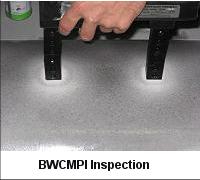1550 Cobb Industrial Dr. | P.O. Box 9098 | Marietta, GA 30065-2098
770-425-1355 (Phone) | 770-425-1354 (Fax) | info@alliedcorrosion.com (Email)
©2018 Allied Corrosion. All rights Reserved.
Made with ❤ by Mighty Good Marketing
Stress Corrosion Cracking Direct Assessment (SSCDA): As defined in the NACE Standard RP0204-2004, Stress Corrosion Cracking (SCC) is the cracking of material produced by the combined action of corrosion and tensile stress (residual or applied). SCCDA Methodology is a procedure that can identify areas where either near-neutral-pH SCC or high-pH SCC can occur on external pipe surfaces. The SCCDA process consists of four steps:
Stress Corrosion Cracking can be caused by combined corrosion and tensile stress, which can include cold deformation and forming, welding, heat treatment, machining and grinding.
In the pre-assessment step, Allied Corrosion or the owner/operator's personnel will collect historical and current data for the purposes of analyzing and prioritizing the threat of Stress Corrosion Cracking. Prioritization of SCC susceptible pipeline segments is performed utilizing the following factors:


The purpose of the indirect inspection step is to collect additional information that was not available in the owner/operator's historical records. Some of the data that Allied could collect in this step would include data from Close Interval Surveys (CIS), Direct Current Voltage Gradient (DCVG) surveys, and terrain conditions (soil type, topography, and drainage) along the right-of-way (ROW) in which the pipeline is located. Once all of this information is assembled, the direct examination site list is finalized and prioritized.


The purpose of the Direct Examination step is twofold. First, this step will either validate or nullify the decision criteria for SCC direct examination site selection. Second, this step provides for the actual digging of the suspected SCC locations for inspection. When performed, these dig sites will render the severity, extent, and type of SCC (intergranular or transgranular cracking). This information is crucial in the post assessment process in order to develop a predictive model and allow for modifications. A wide range of related physical data is collected, along with Magnetic Particle Inspection (MPI) of the susceptible area. NACE Standard RP0204-2004 outlines four different MPI techniques for inspecting the external surface of pipelines. They are:

In the post assessment step, Allied Corrosion or the owner/operator will analyze the data collected from the previous three SCCDA steps for the following purposes:
Our Integrity Management Team is ready to provide turn-key SCCDA services or we can perform any single or multiple step(s) that you, the owner/operator require.
Our strong understanding of the potential destruction from a compromised pipeline allows us to deliver detailed Stress Corrosion Cracking Direct Assessment to complement any operator's Integrity Management program. Our comprehensive pipeline integrity and cathodic protection engineering services will keep your pipeline assets protected throughout its life-cycle.

Contact Allied Corrosion Today
1550 Cobb Industrial Dr. | P.O. Box 9098 | Marietta, GA 30065-2098
770-425-1355 (Phone) | 770-425-1354 (Fax) | info@alliedcorrosion.com (Email)
©2018 Allied Corrosion. All rights Reserved.
Made with ❤ by Mighty Good Marketing
1550 Cobb Industrial Dr. | P.O. Box 9098 | Marietta, GA 30065-2098
770-425-1355 (Phone) | 770-425-1354 (Fax) | info@alliedcorrosion.com (Email)
Made with ❤ by Mighty Good Marketing
Primary voltage range for material
Voltage range in crevices or stagnant and poorly aerated water
We care about your privacy! In order to run a successful website, we are setting cookies and accessing and storing information on your device for various purposes. By continuing to browse this site, you are agreeing to our use of cookies.
If you wish to disable cookies, please visit our Privacy Policy for more information.